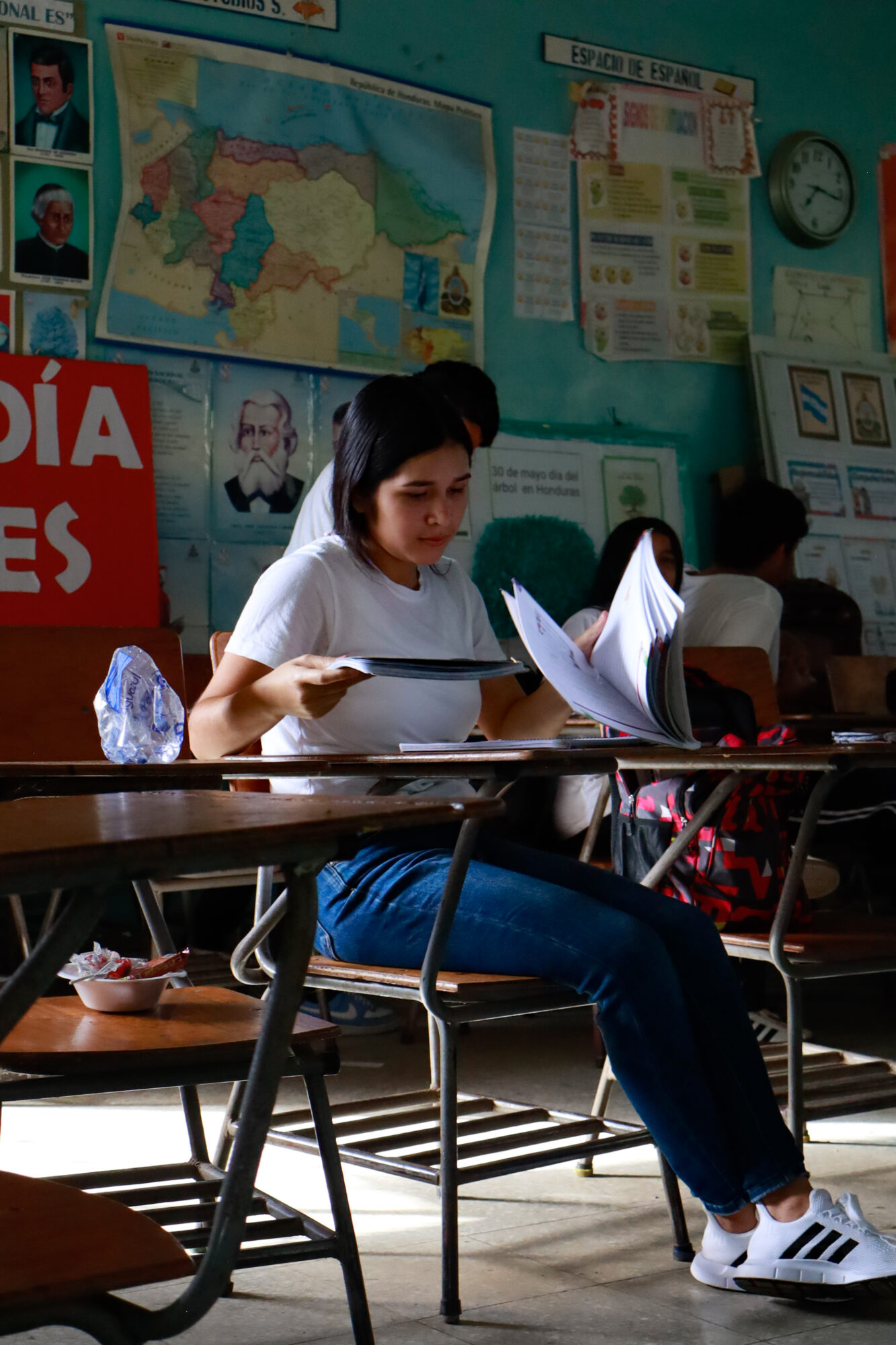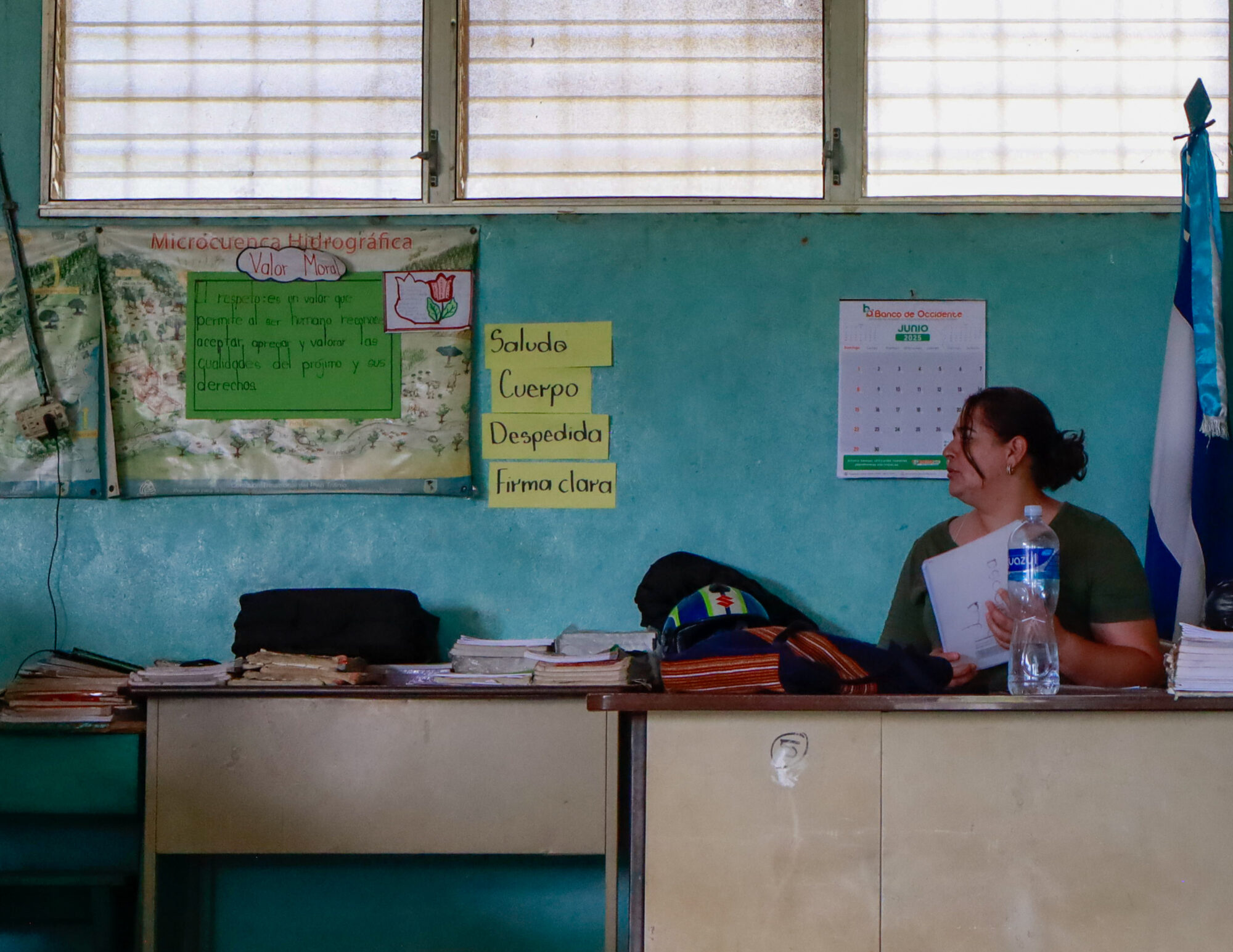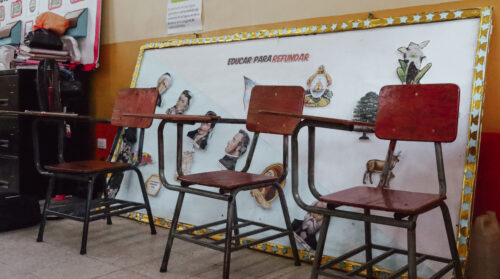“They value knowledge differently,” says Fátima, looking at her students as the rain pounds the tin roof. “Here, they don’t come just to learn. They come to change their history.”
Her classroom sits at the edge of Pie del Cerro, a rural village nestled in the mountains of Ocotepeque, Honduras. The community lives suspended between fog and silence, 1,222 metres above sea level, where the wind bends trees and time moves slowly. Life in Pie del Cerro depends on agriculture: dominant landowning families offer work to locals in the fields, while a few commute to Ocotepeque’s semi-urban centre for informal jobs. The women, however, are almost entirely bound to domestic life. During the rainy season, heavy storms frequently unleash landslides and floods, with the Marchala River swelling dangerously close to homes and crops. In Pie del Cerro, there’s just one school. One place where children gather to learn, while teachers like Fátima do everything they can to make education feel like hope.
According to the national Household Survey conducted by the Honduran Instituto Nacional de Estadística, 44% of children between the ages of 3 and 17 across the country do not attend school. And, in rural areas like this one, exclusion surpasses 48%. Among adolescents aged 15 to 17, the figure rises to 75%. These are statistics that reflect absences, but Fátima knows the faces behind each number.

“It’s not that they don’t want to study,” she says. “It’s that many times they can’t. Because they have to plant crops, take care of siblings, because their notebooks cost money, because no one told them they could.”
The everyday scene confirms this: a boy arrives with wet shoes, a girl asks to leave early to take care of her little brother, and another doesn’t have the money to buy the proper books. For Fátima, these aren’t failures. They’re signs of struggle.
In her classroom, some young people dream of breaking new ground. Not out of shame of their rural background or their parents’ lack of schooling, but to uplift them. “They want to be something different so they can help their parents,” she says. “That’s what drives them.”
But the barriers run deep. Boys are burdened by economic pressure: they’re expected to work in the fields from a young age. For girls, dropping out of school comes with child labour and teenage motherhood. And for all, there’s a deep-rooted feeling that education doesn’t guarantee a future.
“They want to be something different so they can help their parents. That’s what drives them.”
“Sometimes parents say: ‘Why should they study if they’re just going to end up farming anyway?’” Fátima says. “That’s where we come in. We tell them: believe in your children. If you don’t, who will?”
One such case is that of a 15-year-old student, also a mother. She was on the verge of dropping out of school. Some parents feared she would be a bad influence. But Fátima led an open dialogue with the class. “We talked. We decided she would stay. She needed an opportunity.”
Now, when the girl needs to leave early to care for her child, teachers adjust her lessons to help her keep up. “It’s not a gift,” says Fátima, “It’s a way of respecting her reality while maintaining her responsibilities.”
In communities like Pie del Cerro, it’s not uncommon for teenage girls and boys to juggle school and work in the fields, or worse, to be pulled entirely out of the classroom. Many are expected to help with agricultural labour, and in some cases, are even exploited by their own families.
“Educators like Fátima become safe harbours in the middle of difficult storms”
Teachers like Fátima have witnessed these patterns for years. Some girls arrive exhausted after working in coffee fields. Others struggle to afford basic school supplies. In especially difficult cases, students have left home to escape abusive conditions, relying on educators to help them find housing, transportation, and the emotional support they need to continue. “Sometimes we are not just teachers,” says Fátima. “We are their only support network.” And these acts of solidarity aren’t exceptions; they’re part of a daily moral framework shared by educators in underserved communities all over the country.

Still, the support they need is lacking. “We send letters to the government asking for desks, books, anything,” says Fátima. “We get silence in return.” She doesn’t have an official salary. She works without job security. And yet, she stays.
In Pie del Cerro, the school isn’t just a building. It’s a place where children are believed in, sometimes for the first time. Where being born into poverty doesn’t have to mean staying there. Where educators like Fátima become safe harbours in the middle of difficult storms.
